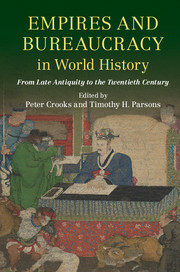Book contents
- Frontmatter
- Contents
- List of Figures
- List of Maps
- List of Tables
- List of Contributors
- Preface
- List of Abbreviations
- Part I Introduction
- Part II Empires and Bureaucracy in World-Historical Perspective
- 2 China as a Contrasting Case: Bureaucracy and Empire in Song China
- 3 Conflict and Cooperation between Arab Rulers and Persian Administrators in the Formative Period of Islamdom, c.600–c.950 CE
- 4 Bureaucracy without Alphabetic Writing: Governing the Inca Empire, c.1438–1532
- 5 The Ottoman Empire (1299–1923): The Bureaucratization of Patrimonial Authority
- Part III From Late Antiquity to the Middle Ages
- Part IV From the Age of European Expansion to the End of Empires
- Part V Afterword
- Index
2 - China as a Contrasting Case: Bureaucracy and Empire in Song China
from Part II - Empires and Bureaucracy in World-Historical Perspective
Published online by Cambridge University Press: 05 August 2016
- Frontmatter
- Contents
- List of Figures
- List of Maps
- List of Tables
- List of Contributors
- Preface
- List of Abbreviations
- Part I Introduction
- Part II Empires and Bureaucracy in World-Historical Perspective
- 2 China as a Contrasting Case: Bureaucracy and Empire in Song China
- 3 Conflict and Cooperation between Arab Rulers and Persian Administrators in the Formative Period of Islamdom, c.600–c.950 CE
- 4 Bureaucracy without Alphabetic Writing: Governing the Inca Empire, c.1438–1532
- 5 The Ottoman Empire (1299–1923): The Bureaucratization of Patrimonial Authority
- Part III From Late Antiquity to the Middle Ages
- Part IV From the Age of European Expansion to the End of Empires
- Part V Afterword
- Index
Summary
Dynasty and ‘Empire’ in Chinese History
Max Weber, in his writing on China, referred to a unitary Chinese empire, one that lasted more than two thousand years. This reflected the common nineteenth-century European view of Asia as static and unchanging. Contemporary understandings of Chinese history are quite different. Changes in dynasties were not simply changes in the family that supplied the ruler. The transition between the major dynasties – especially the five that lasted two hundred years or more (Han, Tang, Song, Ming and Qing) – were generally marked by major disruptions in the power structure. Although new dynasties drew from the governmental practices of the past, the states they created were fundamentally different in many ways. It is historically more accurate to see a succession of states/empires in China than a single one which was interrupted from time to time. Sometimes there were two relatively powerful states at the same time occupying different parts of China.
In modern scholarship, the term ‘empire’ is often reserved for political units that distinguish a central or metropolitan region from subordinate or peripheral units, often recently conquered ones. This still allows for considerable variation in political organization, from highly intrusive takeovers of the conquered territory's government to much looser forms of political control, such as those exercised by tributary empires, which collect revenue from vassal states but allow them to retain their own rulers and laws. Moreover, in general usage, particularly large countries have often been referred to as empires. As Susan Reynolds notes: ‘emperor and empire came to be used generally for any Asian rulers who seemed so rich and powerful and maybe, above all, so dangerous that they deserved the grander title.’ The term ‘empire’ is also widely used for the larger and stronger ancient states, such as the Persian empire and the Assyrian empire.
These various understandings of ‘empire’ do not correspond well to Chinese distinctions. Although, in modern times, terms were created to translate ‘empire’ (diguo) and ‘imperialism’ (diguo zhuyi: literally, ‘empire-ism’), they are negative terms associated with nineteenth- and twentieth-century colonial empires. What in English is called the Tang empire is referred to in Chinese as the Tang dynasty (Tang chao) or Tang state (Tang guo). During the dynasty, the common way to refer to the country was as ‘the great Tang state’ (da Tang guo).
- Type
- Chapter
- Information
- Empires and Bureaucracy in World HistoryFrom Late Antiquity to the Twentieth Century, pp. 31 - 53Publisher: Cambridge University PressPrint publication year: 2016
- 2
- Cited by



